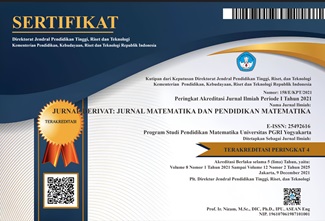Pengaruh Self-Efficacy Terhadap Hasil Belajar Matematika Pada Pembelajaran Tatap Muka Terbatas
DOI:
https://doi.org/10.31316/jderivat.v10i2.1983Abstract
The achievement of learning outcomes is usually influenced in students, one of which is self-efficacy. This study aims to determine the effect of self-efficacy on mathematics learning outcomes for students at 9th grade of MTsN 5 Sleman in limited face-to-face learning. This study uses a quantitative approach ande the type is survey research. The data collection instrument used a self-efficacy questionnaire and mathematics learning outcomes were obtained through a daily assessment test of geometric transformation material. The analytical technique used descriptive statistical analysis and inferential statistical analysis, namely simple linear regression. The results showed that: (1) the contribution of self-efficacy influence of independent variables on the dependent variable mathematics learning outcomes by 2.3% and the remaining 97.7% is influenced by other variables not examined, (2) the analysis results showed that the value of thitung = -1.135 <t???????????????????? = 2,005 with significant value = 0.261 > α = 0.05, so there is no influences of self-efficacy on learning outcomes math class IX students MTsN 5 Sleman-face learning is limited, which means influenced by other factors which is not the focus of this study.
Keywords: mathematics learning outcomes, limited face-to-face learning, self-efficacy
Published
Issue
Section
Citation Check
License
Copyright (c) 2023 Jurnal Derivat: Jurnal Matematika dan Pendidikan Matematika

This work is licensed under a Creative Commons Attribution-ShareAlike 4.0 International License.
Authors who publish with this journal agree to the following terms:
-
Authors retain copyright and grant the journal right of first publication with the work simultaneously licensed under a Creative Commons Attribution-ShareAlike 4.0 International License that allows others to share the work with an acknowledgment of the work's authorship and initial publication in this journal.
- Authors are able to enter into separate, additional contractual arrangements for the non-exclusive distribution of the journal's published version of the work (e.g., post it to an institutional repository or publish it in a book), with an acknowledgment of its initial publication in this journal.
- Authors are permitted and encouraged to post their work online (e.g., in institutional repositories or on their website) prior to and during the submission process, as it can lead to productive exchanges, as well as earlier and greater citation of published work (See The Effect of Open Access).







